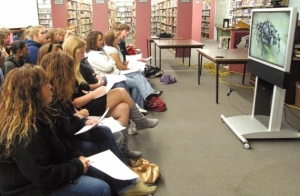SWHS students visited NASA without ever leaving school
By Phyllis Moore
Published in News on December 16, 2009 1:46 PM

News-Argus/BOBBY WILLIAMS
Southern Wayne High School students in the Science National Honor Society learn about robotics during a "virtual field trip" to NASA via Web cam recently.
Southern Wayne High School science students took a field trip to NASA on a recent Friday afternoon and still made it home in time for dinner.
The virtual field trip took place in the school's media center as 45 students from the Science National Honor Society linked up with NASA via a Web cam. For nearly an hour, they interacted with Greg Pitzer, a robotics technician at NASA Digital Learning Center, to learn more about the robotics program.
Pitzer shared about "Spirit" and "Opportunity," the two Mars Rovers that have been collecting data on the Red Planet for about six years.
"They were only designed to last about six months," he said.
Pitzer showed a model of one of the rovers, as well as photos of Mars and its landscape, captured by some of the robotic cameras.
"Its 150 million miles away and we're getting details on this, that's pretty cool," he told the students.
It takes hundreds of people to do such work, Pitzer said, although the number that work on an individual robot comes closer to being 30 to 40.
"There are people who manage each of the different sections, people who have the tools to do the research -- typically robot commands, work on making sure the landing is correct," he said, and on average it takes about five to seven years for completion. Every two years, a mission is launched on Mars, he added.
Southern Wayne, one of only two schools in the county with a Science National Honor Society -- Spring Creek High is the other -- tapped into the virtual field trip resource after being trained by Computer Software Innovations.
"There are a lot of students who haven't been able to travel out of the region," said Derek Ommert, account manager with CSI, based in Raleigh. The federally-funded program is free to educators, he said. "It limits liability, they don't have to drive a bus."
There are other merits for the program, said Karin O'Donnell, the club's advisor, who also teaches physical science and biology at the school.
"While they might tune us out here, they're very interested in what he's doing" on the screen, she said. "Plus I'm not pulling them out of as many classes. They're able to get this nice bit of technology and novelty without missing as much of their other lessons during the day."
In turn, the acquired information can be shared with other science teachers at the school, she added.
"Part of the goal of the Science NHS is to foster a better understanding and more access to science and technology and create a better understanding of science in our world," Mrs. O'Donnell said. "We decided to give this a trial run."
The virtual field trip idea also spans other curriculum areas, Ommert said.
"Math, foreign languages -- we can have a class of Americans who can speak English (lined up) with a French-speaking class in France so they see each other on TV, anywhere you can connectivity through the Internet you can reach," he said. "We have taken groups to the Alaska Sea Life Museum, they could not believe they were watching it live."
In addition to expanding teaching areas in the classroom, Mrs. O'Donnell said the concept will also broaden the students' futures.
"It will make our students think of career opportunities that are definitely involved in technology beyond Wayne County," she said.
Student feedback on the robotics unit was very positive. Senior officers weighed in at program's end.
Katie Kendall, vice president, who wants to one day work in DNA analysis, enjoyed the presentation.
"We didn't miss much school but got to get out of the classroom," she said.
Amanda Edwards, historian, said, "I thought it was really cool because he could see us and talk to us. I didn't know anything about robotics. I learned a lot."
President Holly Jones has always been interested in taking things apart and putting them back together again, so appreciated the techniques used in building a robot.
"I'm actually going to be a lawyer, but I'm going to have to take apart a crime scene," she said.
Jeni Koninsky, treasurer, said she came away with a greater understanding of robotics.
And Ramsey Turner, secretary for the club, was particularly interested in the advanced technology.
"I thought it was really neat," he said. "Some of the stuff helps show us what they're working on (and) it's interesting how stuff has changed."
Mrs. O'Donnell said she hopes to do future projects like this and has an eye on doing a forensics unit with a smaller group.
